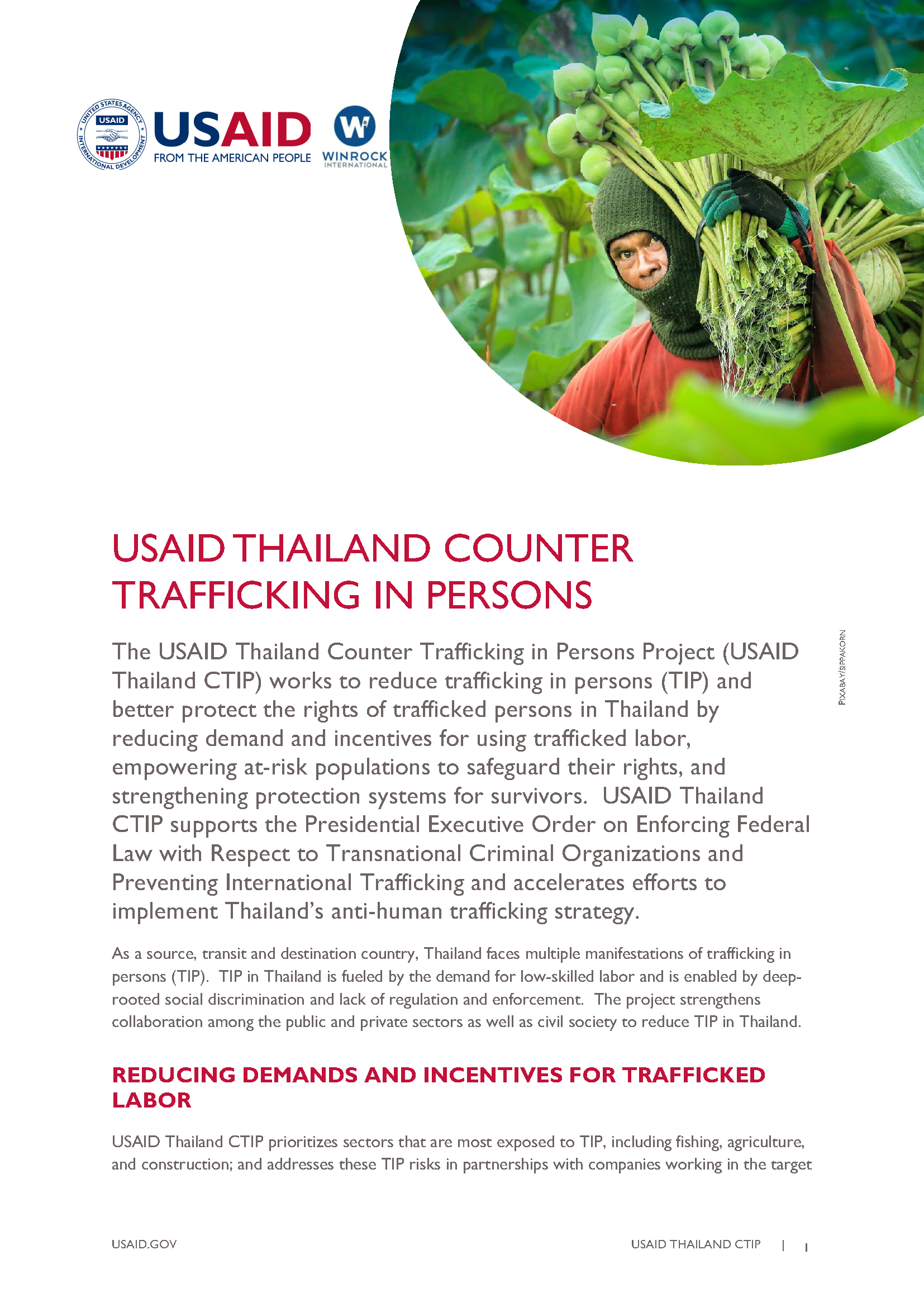Speeches Shim
USAID Thailand Counter Trafficking in Persons ![]() (pdf - 293k)
(pdf - 293k)
The USAID Thailand Counter Trafficking in Persons Project (USAID Thailand CTIP) works to reduce trafficking in persons (TIP) and better protect the rights of trafficked persons in Thailand by reducing demand and incentives for using trafficked labor, empowering at-risk populations to safeguard their rights, and strengthening protection systems for survivors. USAID Thailand CTIP supports the Presidential Executive Order on Enforcing Federal Law with Respect to Transnational Criminal Organizations and Preventing International Trafficking and accelerates efforts to implement Thailand’s anti-human trafficking strategy.
As a source, transit and destination country, Thailand faces multiple manifestations of trafficking in persons (TIP). TIP in Thailand is fueled by the demand for low-skilled labor and is enabled by deep-rooted social discrimination and lack of regulation and enforcement. The project strengthens collaboration among the public and private sectors as well as civil society to reduce TIP in Thailand.
REDUCING DEMANDS AND INCENTIVES FOR TRAFFICKED LABOR
USAID Thailand CTIP prioritizes sectors that are most exposed to TIP, including fishing, agriculture, and construction; and addresses these TIP risks in partnerships with companies working in the target provinces of Bangkok, Chiang Rai, Trat, Sa Kaeo, Surat Thani and Phuket, all of which have significant migrant worker populations or are located near trafficking routes.
USAID Thailand CTIP is also implementing a national campaign to reduce Thai citizens’ tolerance for forced labor in products and services, while increasing empathy toward trafficked persons. The project also leads community-level interventions supporting civil society, TIP change agents, and migrant networks to foster cross-sectoral collaboration to improve Thailand’s response to TIP.
EMPOWERING AT-RISK POPULATIONS TO SAFEGUARD THEIR RIGHTS
At-risk groups are empowered through strengthened access to reliable information and tools. USAID Thailand CTIP mentors and strengthens the capacity of local organizations to better reach and assist vulnerable migrants, equipping them with information and tools to protect their rights. The project-developed Thailand Migrant Protection Resource Toolkit contains updated information on policies and regulations, as well as useful content and tools for civil society organizations serving migrant populations. USAID Thailand CTIP also trains volunteer migrant leaders in spotting signs of exploitation and trafficking, referring potential victims to existing services, supporting them in accessing grievance mechanisms, and amplifying migrant voices in the political discourse by empowering them to capture and share their stories through various tools.
STRENGTHENING PROTECTION SYSTEMS
USAID Thailand CTIP engages government stakeholders at both the national and provincial levels, continually working toward aligning existing procedures and processes for identifying trafficked persons with international and regional standards and evidence-based practices. Furthermore, the project facilitates collaboration between the government, civil society, and private sector companies, to promote a rights-based approach to victim identification and assistance. This includes refining and actualizing alternative victim-centered care models, addressing barriers in self-identification, and establishing sustainable and market-driven livelihood services.
IMPACTS AND RESULTS
By taking a multi-sectoral approach, the project achieved the following accomplishments:
- In Phuket, USAID Thailand CTIP set up a Migrant Development Center for fishermen who need counseling or information about their rights and entitlements.
- In partnership with Mars Petcare, the project is piloting sustainable technology for connectivity-at-sea that will link workers on fishing vessels to information and assistance.
- Working with companies in the sugarcane industry, USAID Thailand CTIP is developing a self-assessment tool for farm owners to ensure compliance with labor standards and prevent TIP.
- In partnership with the Royal Thai Government, USAID Thailand CTIP helped identify achievements and barriers in trafficking victim identification, with input from stakeholders. The results of these discussions will guide advocacy for improved policies at the national level.


Comment
Make a general inquiry or suggest an improvement.